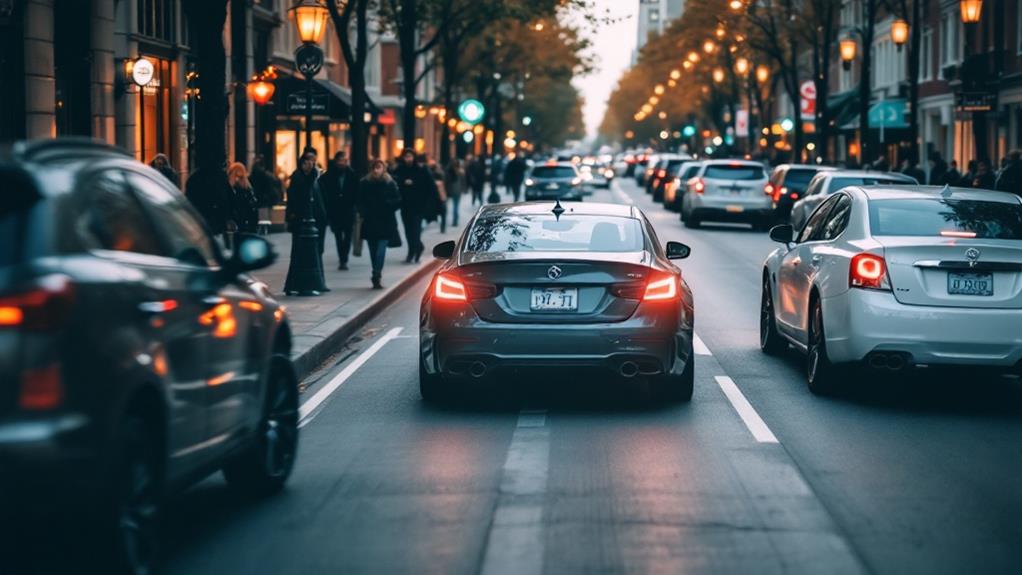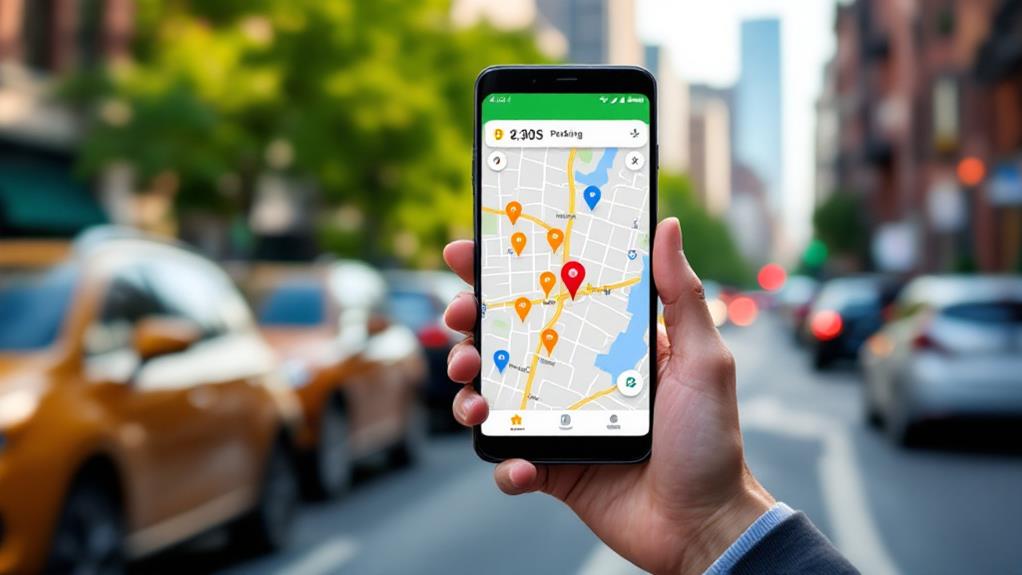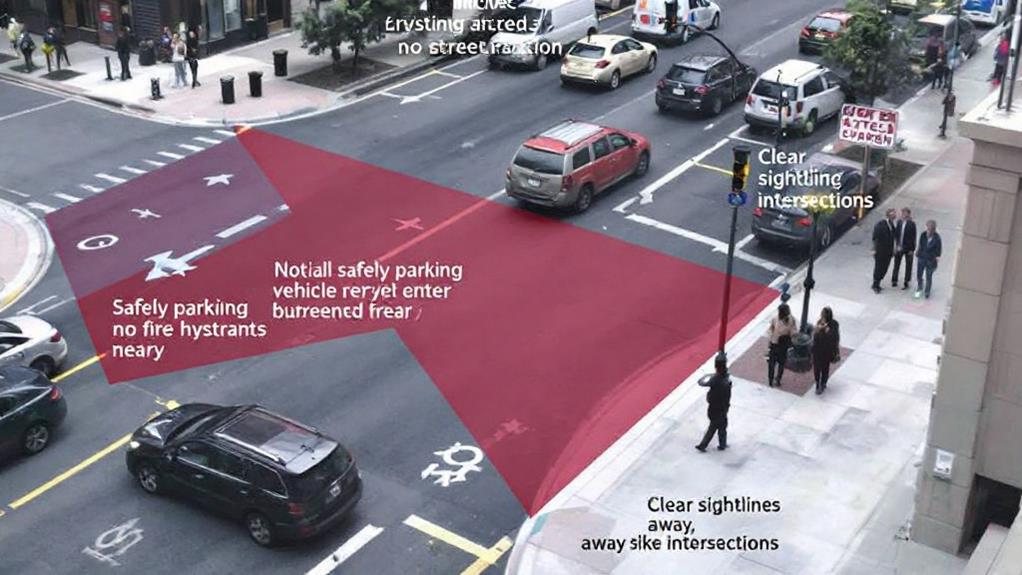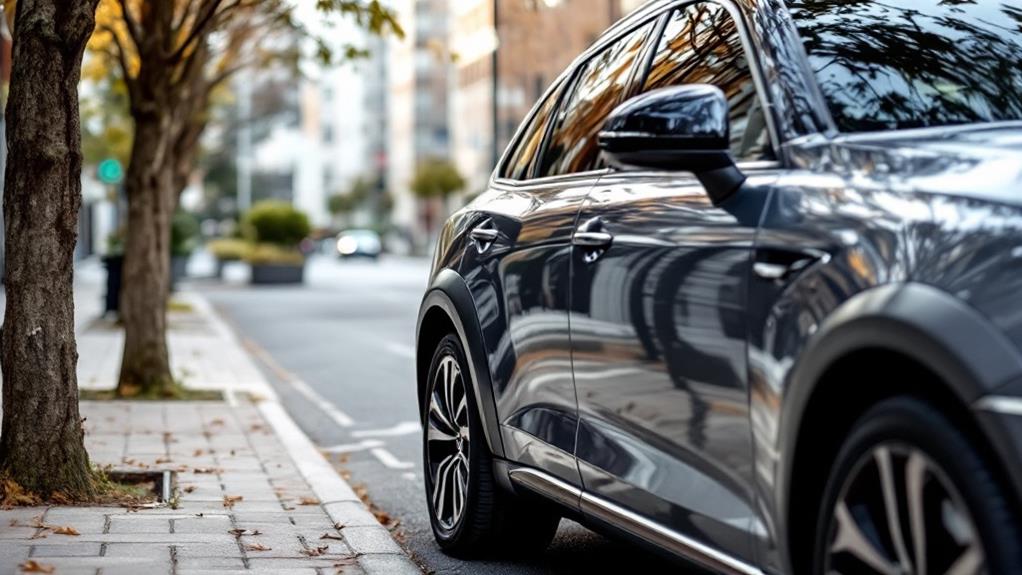How to Avoid Tickets When Street Parking in the City
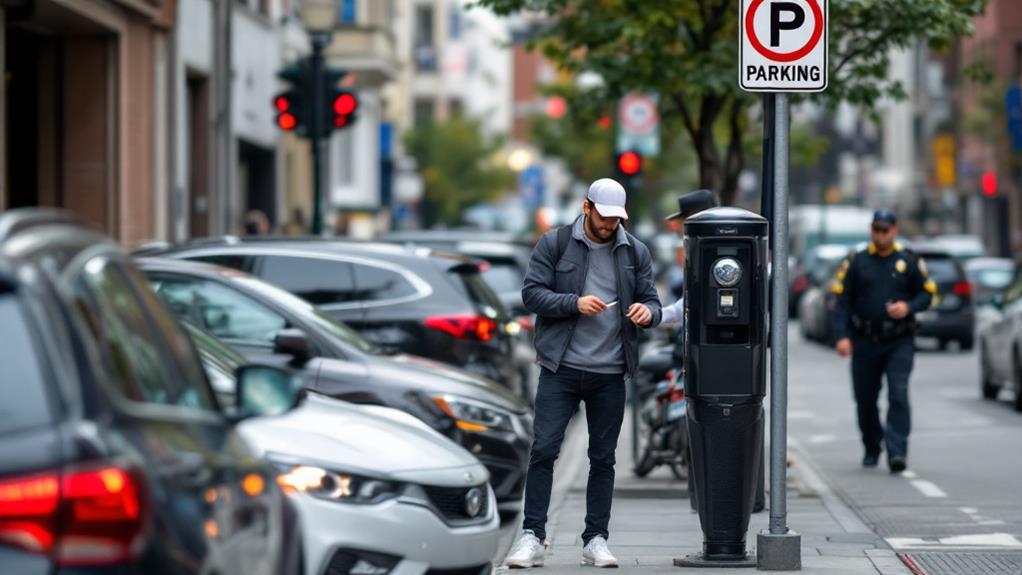
To avoid parking tickets in the city, always check parking signs carefully for time limits and restrictions. Utilize mobile payment apps to guarantee you're within allowed hours and can prolong your time if needed. Mind the time limits and don't overstay. Park your vehicle within 18 inches of the curb to maintain proper distance. Respect special parking zones, including loading areas and mobility lanes. Stay clear of intersections, fire hydrants, and crosswalks. Be aware of event-related parking limitations and large vehicle regulations. If you do receive a citation, know your options for disputing it. These tips will help you traverse city parking with confidence.
Check Parking Signs Carefully
When it comes to street parking in the city, your first line of defense against tickets is to carefully read and understand parking signs. Check all signs in the vicinity of your parking spot to avoid any surprises. Pay attention to time limits, special event restrictions, and tow-away zones. These signs are your guide to legal parking and can save you from costly tickets or towing fees.
Be aware of mobility lane hours, typically from 7am to 9am and 4pm to 6pm. During these times, many areas become tow-away zones. Don't park in spots marked "No Parking" or block driveways and sidewalks, as these create safety hazards. When you park, guarantee you're at least 15 feet from a fire hydrant and 20 feet from a crosswalk. Also, keep a distance of at least 10 feet from any stop sign to avoid being considered illegally parked. By following these guidelines and staying vigilant about parking signs, you'll considerably reduce your chances of receiving a ticket. Remember, a few extra minutes spent checking signs can save you time, money, and frustration in the long run.
Use Mobile Payment Apps
Increasingly, cities are adopting mobile payment apps to streamline parking payments and help drivers avoid tickets. The City of Houston, for example, offers ParkHouston and ParkMobile apps to make parking easier and more convenient. These apps, along with other mobile payment options, allow you to pay for parking, receive alerts before your session expires, and add more time from your phone.
To use these apps effectively, you'll need to enter your license plate number correctly. Avoid using the letter "O," special characters, or spaces when inputting this information. It's also essential to select the correct vehicle in the app to prevent any issues with your parking session.
Mobile payment apps provide a safe and efficient way to comply with Texas Transportation Code parking regulations. They're part of ParkHouston's convenient payment options, designed to help us make parking easier and avoid citations. Remember to check the signs carefully before using these apps, as they'll indicate whether mobile payment is accepted in that area. By using Google Pay or credit cards integrated with parking apps, you're taking a simple yet effective step to stay compliant with city regulations and avoid parking tickets.
Mind Time Limits
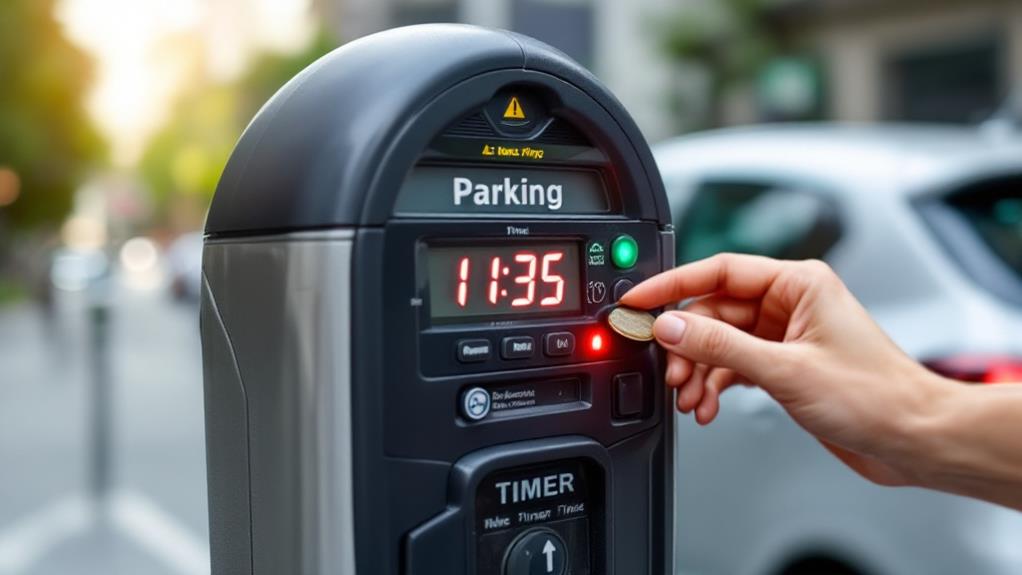
In spite of the convenience of mobile payment apps, minding time limits remains vital for avoiding parking tickets in the city. When you park at a meter or in a City parking lot, always check signs, receipts, or pay stations to be aware of the time limits. It's imperative to move your car after the time limit expires to avoid receiving a citation.
Use the ParkHouston app to receive alerts before your parking session expires and add more time from your phone. This eliminates the need to run back to your car or use the new pay stations. However, don't try to exceed time limits by constantly adding time or moving your car a short distance. Parking beyond the posted time limit, even by a few minutes, can result in a citation.
To help parking make sense, review the Texas Transportation Code and familiarize yourself with Violation Codes. Remember, convenient payment options to receive an alert don't exempt you from time limits. If you need to enter any special characters or produce a printed receipt, use the pay stations. By minding time limits and using these tips, you'll reduce the risk of getting a Parking Citation and avoid the hassle of having to resolve it later.
Maintain Proper Curb Distance
Proper curb distance is an essential yet often overlooked aspect of street parking. To avoid parking citations, you must position your vehicle within 18 inches of the curb. This rule applies regardless of which direction your car is facing. Many drivers don't realize that improper curb distance can lead to tickets, even if their vehicle isn't obstructing traffic.
When you're parking on the street, take a moment to carefully maneuver your car close to the curb. Remember, anything beyond 18 inches is considered improper parking and can result in a citation. It's not just about avoiding tickets, though. Maintaining the correct curb distance is indispensable for safety and accessibility. Vehicles parked too far from the curb create hazards for pedestrians, bicyclists, and other road users.
Respect Special Parking Zones
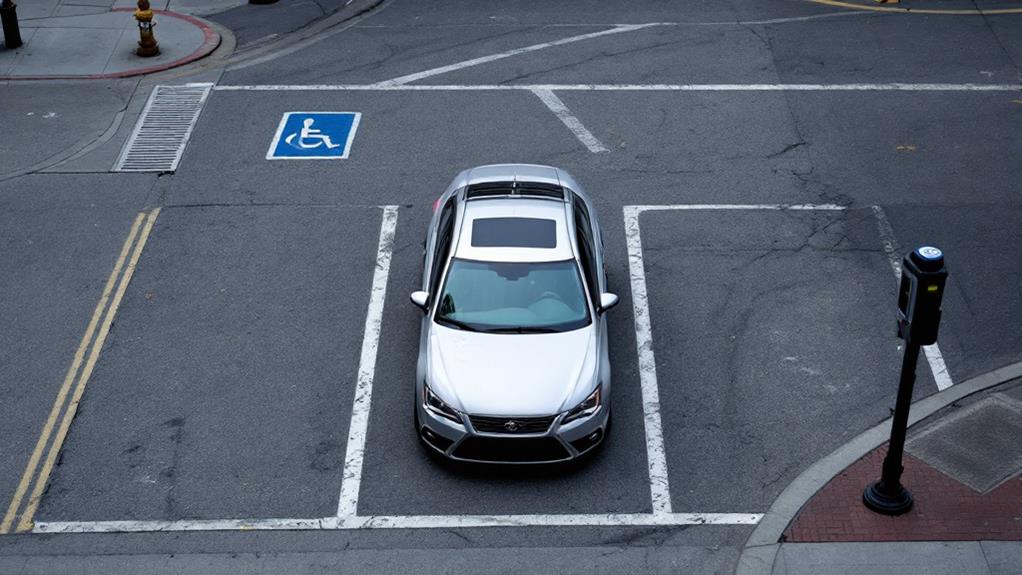
Traversing special parking zones can be a minefield for city drivers. To avoid tickets and tow-away zones, you'll need to respect various restrictions and reserved areas. First, steer clear of commercial vehicle loading zones unless your vehicle displays company logos. These areas are strictly for business use.
Pay attention to mobility lane hours, typically from 7am-9am and 4pm-6pm. Parking in these lanes during restricted times can result in your car being towed. Keep an eye out for special events that may alter parking rules, and avoid red-bagged meters, which indicate temporary restrictions.
When parking near intersections, maintain a 20-foot distance from crosswalks to safeguard pedestrian safety and visibility. Similarly, leave at least 15 feet between your vehicle and any fire hydrants you encounter. This space is indispensable for emergency access.
Avoid Blocking Driveways
Thoughtfulness towards property owners is essential when parking on city streets. When you're looking for a spot, be mindful of driveways and make certain you're not blocking access. Remember, it's not just about avoiding tickets; it's about being considerate to your neighbors.
Don't park in a way that blocks the sidewalk. Even if your car is parked in your driveway, extending onto the sidewalk creates a safety hazard. Signs are not required to enforce this rule. Also, be aware of other pivotal parking regulations:
- Keep at least 15 feet from a fire hydrant
- Stay 20 feet away from a crosswalk at an intersection
- Don't park within 10 feet of a stop sign
- Maintain at least 18 inches from the curb, regardless of the direction it is facing
Park Away From Intersections
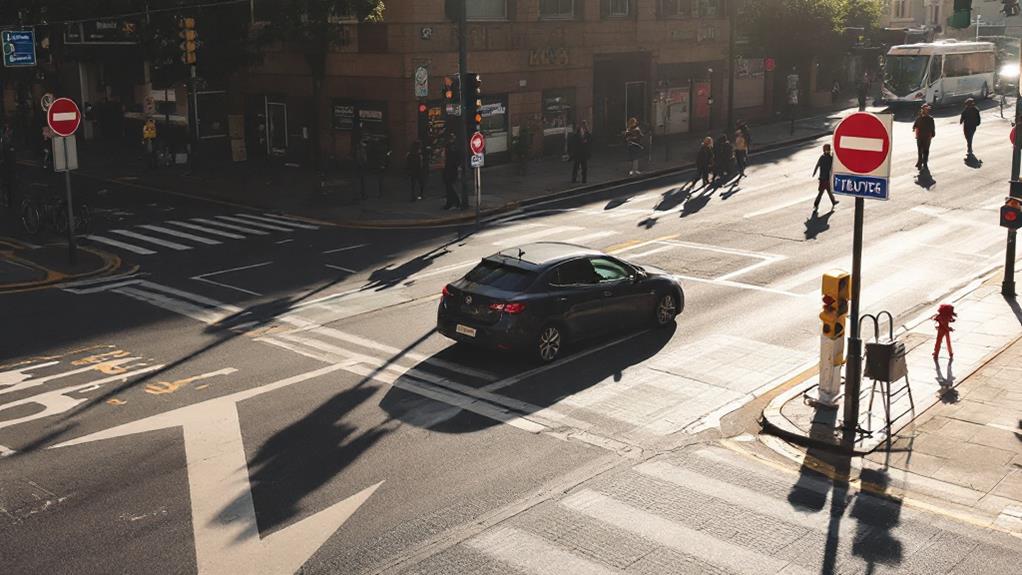
When it comes to street parking, intersections require special attention. You'll need to be mindful of several rules to avoid tickets and guarantee parking safety for neighborhoods. First, remember that vehicles parked within 20 feet of a crosswalk at an intersection are not legally parked. This means you shouldn't park at the curve or apron part of the street near intersections.
Additionally, you must park at least 10 feet from a stop sign. To stay safe, it's best to park further apart from intersections whenever possible. Look for signs on the block that indicate emergency no parking zones or other restrictions. Keep in mind that parking a vehicle less than 15 feet from a fire hydrant is prohibited, so always check for these before settling on a spot.
When parking near an intersection, make sure you're at least 18 inches from the curb, regardless of which direction you're facing. This helps maintain proper traffic flow and visibility. Finally, be aware that Red-bagged meters are reserved and shouldn't be used. By following these guidelines, you'll reduce your chances of getting a ticket and contribute to safer streets for everyone.
Be Aware of Event Restrictions
Traversing event restrictions can be tricky when parking in the city. You'll need to be vigilant about special event parking regulations to avoid costly tickets or towing. Keep an eye out for red-bagged meters, which are reserved for specific purposes during events. These meters, along with emergency no parking zones and tow-away zones during commute hours, can catch you off guard if you're not careful.
Always check signs thoroughly for any event-related limitations. Some blocks become tow-away zones during special events or commute hours, so it's pivotal to familiarize yourself with local event schedules. Don't assume that a spot is available just because it's empty – it might be reserved at all times for emergency vehicles or event parking.
To avoid parking headaches during special events, consider these visual cues:
- Red bags covering parking meters
- Temporary "No Parking" signs with specific dates and times
- Barriers or cones blocking off certain areas
- Event staff directing traffic or monitoring parking
- Special event permit signs in nearby windows
Understand Large Vehicle Regulations
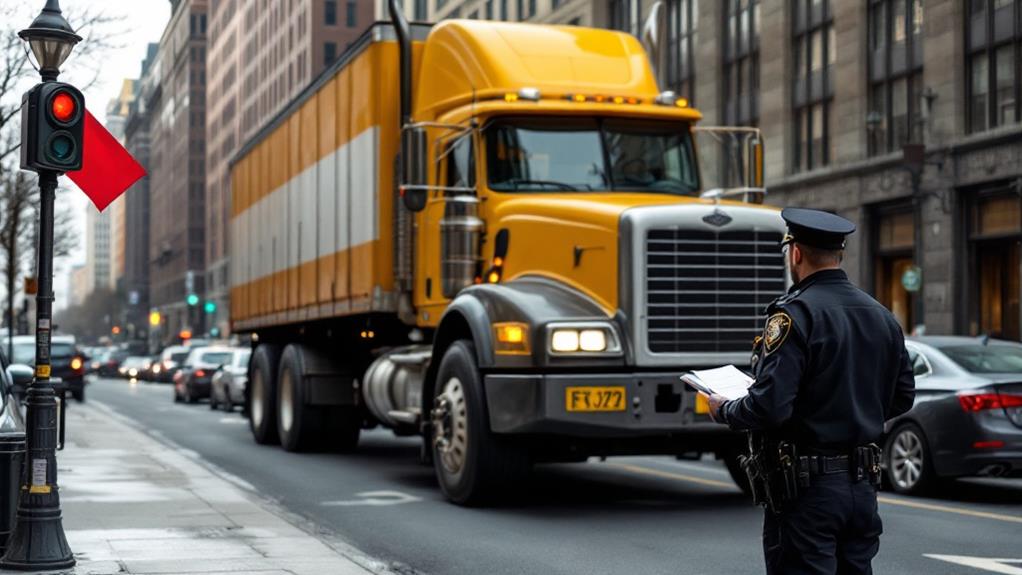
Large vehicle owners face additional parking challenges in urban areas. If you're driving a large vehicle in the city, you must understand the specific regulations to avoid costly tickets. Street parking for large vehicles is limited to a 2-hour time limit, and it's prohibited from 2 a.m. to 6 a.m. These rules aim to address safety issues and negative impacts caused by large vehicles.
To comply with these regulations, you must move your car every two hours during the day and find alternative parking at night. We recommend parking in lots or private parking lot facilities that can accommodate larger vehicles. If parking in marked commercial areas, make certain you have a printed receipt for proof of payment. Remember, even if you have company logos displayed, you can't park overnight on the street.
These changes simplify enforcement for the Houston Police Department and address challenges with pedestrians and residents using the right-of-way. To test your parking knowledge and see if you really know the rules, check out the tips presentation below. It provides significant information about special events and emergency parking restrictions. Stay informed to avoid tickets!
Know Citation Dispute Options
Facing a parking citation can be frustrating, but you now have more options to dispute it. The city has extended the online contest period from 7 to 30 days, giving you ample time to gather evidence and build your case. You're no longer required to post a cash bond to schedule a hearing, making the process more accessible. If you decide to contest your citation in court, you'll now find prosecuting attorneys present, ensuring a fair hearing.
For those struggling with booted vehicles, payment plans are now available, addressing concerns about paying in full. To avoid citations altogether, keep these parking tips in mind:
- Always check for red-bagged meters before parking
- Be aware of different parking zones and their restrictions
- Use the "Is it legally parked?" feature on the city's website
- Look for "Citation (Español) Accesible" signs for language assistance
- Double-check your parking spot against the Violation list
